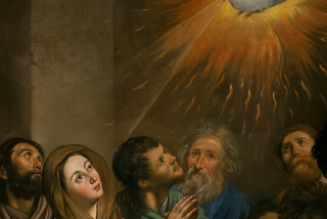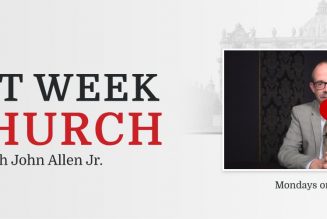
This Sunday is Gaudete (Rejoice) Sunday, the Third Sunday of Advent, Year C. It’s called that for several reasons: “Rejoice” is the first word of the Entrance Antiphon at Mass; the pink candle means we’re more than halfway to Christmas; and the readings stop focusing on the terrible times to come and start expecting the joy that’s nearly here.
Here are six takeaways from the readings at Mass, taken from previous “This Sunday” columns.
First: I, for one, rejoice that St. John the Baptist’s message isn’t harsh.
John the Baptist tells the disciples what God expects of them, and it turns out to be … love.
The crowd gathers around this intense insect-eating prophet in camel hide. They have been moved by his insistent preaching and his radical lifestyle, and they are ready to take the next step. They ask him: “What shall we do?”
They may have expected something severe and challenging — but his answer is very “doable” and very deep, both at the same time.
It turns out you don’t have to be a cave-dwelling hermit to get Christ’s promised peace. He tells them, “Whoever has two cloaks should share with the person who has none, and whoever has food should do likewise.” In other words: You don’t have to give everything away, but you do have to share what you have with those in need.
John the Baptist doesn’t ask people to embrace mortification like gluttons for pain. He asks them to embrace mortification out of love — to sacrifice enough to share with others and to keep on sacrificing in order to keep on sharing.
Next, he tailors his message to specific professions. For each, his advice is the same: Love. But it is a practical and reasonable love. To tax collectors, he says, “Stop collecting more than what is prescribed.” To soldiers, he says, “Do not practice extortion, do not falsely accuse anyone, and be satisfied with your wages.”
Tax collectors need to be good tax collectors. Soldiers need to wield their power fairly and stop complaining about their pay and their orders. No one is told to quit what they are doing to become social workers or preachers. They just need to live their own professions while caring for others. They just need to love.
This is a reason to rejoice because, second, you can apply John the Baptist’s logic to today.
What would John tell us in the 21st century? He wouldn’t ask us to be Mother Teresa — he would ask us to be a good mom, a good dad, a good son, daughter, worker, student, parishioner and neighbor.
That’s it.
To moms, he might say: “Offer your children to the Lord and accept his will for them, whether it’s what you want or not.”
To dads, he might say: “Be present to your children. Know them well enough and talk to them often enough to be able to guide them each day.”
To people in our workplaces he might say: “Be honest with your boss, and with your customers. Help others get ahead, instead of just looking out for yourself.”
To all of us this Advent, we know exactly what he would say, because the Church and St. Paul say the same thing …
Third, they command us to “rejoice.”
The Second Reading today says it clearly when St. Paul commands us:
“Rejoice in the Lord always. I shall say it again: Rejoice!”
“Command” is a strong verb. “To command” is for someone in a position of authority to constrain a subordinate from doing his own will and demand he do the commander’s will instead. The Ten Commandments are examples: They command what we “Shall” always do and “Shall not” ever do, or else. Jesus gives us another example when he “commands” demons to come out of people, and they obey.
Jesus also “commands” us to love one another, too, which tells us A.) that Jesus prioritizes love as the highest good and B.) that love is a choice: It is not something we experience; it is something we choose to do or refuse to do.
So when we are commanded by the Church and Scripture to rejoice, we know that it must be something in our power and that it must be a high priority. So, what does it mean for someone to obey the command to rejoice? Says St. Paul:
“Have no anxiety at all, but in everything, by prayer and petition, with thanksgiving, make your requests known to God.”
Note that “no anxiety at all” part. That doesn’t mean “some anxiety;” it doesn’t mean “understandable anxiety that everyone would expect you to have with everything you have to deal with.” It means none. And that is not easy. It is something you have to ask God’s help to accomplish.
But once you get it, says St. Paul:
“Then the peace of God that surpasses all understanding will guard your hearts and minds in Christ Jesus.”
That sounds like a great deal. How do we get it?
That’s fourth: St. John the Baptist goes on to identify the source of our joy.
Last week, John the Baptist has been telling us to make straight the ways; to fill the valleys and level the mountains. This week, he tells us to live our state in life fully. Then he goes on to describe the Lord who is coming into our lives. The Gospel calls it “good news to the people,” but might not seem like good news at first.
- We are expecting a babe in a manger. But John says, “One mightier than I is coming.”
- We are picturing someone too young to put his own clothes on. But John says, “I am not worthy to loosen the thongs of his sandals.”
- We are thinking of herald angels and a distant star. John says: “He will baptize you with the Holy Spirit and fire.”
- We are longing for the “holy infant so tender and mild” laying in the hay. John says “His winnowing fan is in his hand to clear his threshing floor and to gather the wheat into his barn, but the chaff he will burn with unquenchable fire.”
So, just as the behavior John the Baptist expects from us is easier than we expect but harder than we want, the Messiah he describes is greater than we expect and tougher than what we want.
The Church puts these harder images of the incarnation in Advent to train our feelings and sharpen them. To understand how astonishing Christmas is, we have to remember that God is a “consuming fire;” and that “it is a fearful thing to fall into the hands of the living God.”
God becoming man cannot just mean warm cozy feelings; it should give us bold, triumphant feelings like what we hear in the First Reading from Zephaniah:
“Shout for joy, O daughter Zion! Sing joyfully, O Israel! Be glad and exult with all your heart, O Daughter Jerusalem! The Lord has removed the judgment against you; he has turned away your enemies,” it says, and “The Lord, your God, is in your midst, a mighty Savior.”
This turns out to be the best reason of all to rejoice.
Because, fifth, a God whose power is more than “warm and cozy” is the only kind of God capable of bringing lasting joy.
Because Jesus is the immense and powerful figure of the Old Testament and St. Paul, he is powerful enough that he can change our lives and reshape our world. And he is powerful enough that we can each have a sacramental encounter with him and union with him.
The “Psalm” this week is actually a canticle from Isaiah and it can be read (and has been read) as a commentary on the sacramental life.
- “With joy you will draw water at the fountain of salvation” we pray — and that means our baptism is a continual source of rejoicing for us.
- “I am confident and unafraid. My strength and courage is the Lord,” it says — describing the gifts of the Holy Spirit that come from confirmation and end in joy.
- “Cry with joy and gladness, for among you is the great and holy one of Israel,” it says, describing what is absolutely true for us in every tabernacle on earth and on every Mass.
Christmas is coming, and Jesus is already here, in the sacraments. The real joy of Christmas is the joy of receiving Divine life into our own humanity and telling him how much we love him — with our actions as well as our words.
Image: Lawrence Lew OP, Flickr







